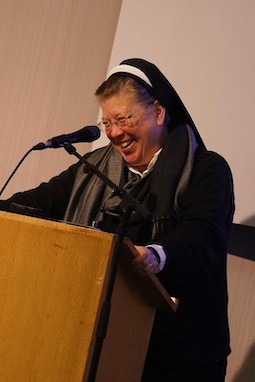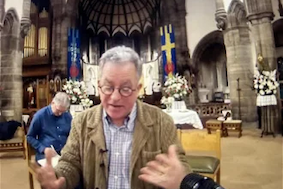A Synodal Journey with Women, Youth and the Marginalised

Sr Maria Kolbe
In a desire to improve the lives of marginalised women, sixty women and seven men spent a weekend at Ushaw College, Durham to walk together on a synodal path. Organised by the National Board of Catholic Women (NBCW), the conference Women at the Periphery Taking Centre Stage, 25-27 November 2022, was a response to the Synod of Bishops' express statement of the fundamental importance that the voice of the poor and excluded find a place (Preparatory Document, no. 31). Indeed, the Vatican's synthesis of responses from 112 conferences of bishops around the world states, In every area of their lives, women ask the Church to be their ally … [and address] the social realities of impoverishment, violence and diminishment faced by women across the globe (Document for the Continental Stage, no. 62).
Women leaders working with those on the margins joined with Sr Marie Kolbe Zamora from the Vatican's General Secretariat of the Synod of Bishops, with Professors of Theology and Religion, Anna Rowland and Karen Kilby from Durham University, and with Abbot Hugh Allan, representing the Catholic Bishops' Conference of England and Wales (CBCEW), organiser Margaret Clark (NBCW President) and chair, Amy Cameron (Synod lay co-ordinator, Hexham and Newcastle Diocese). Imparting the harsh realities of lives caught up in prostitution, poverty, violence and domestic abuse, which are exacerbated by climate change and transition, speakers included Dr Pat Jones (Women at the Well), Elizabeth Palmer (SVP), Nikki Dhillon Keane (Violence Against Women and Girls Committee of NBCW and safeinfaith.org.uk) and Christine Allen (CAFOD). These leaders each spoke of the dignity and sensitivity of each person, and of the faith-based educational, financial, and social resources including accompaniment and counselling.
The conference coincided with the UN Day for Elimination of Violence Against Women, and sixteen days of Activism Against Gender-based Violence, and conferees were appropriately bedecked with orange poppies. Important reminders of co-responsibility and resources available through Catholic and other faith-based organisations were given, including the NBCW-Domestic-Abuse-A4-Booklet.pdf, also made available to each parish in England and Wales. Abbot Hugh used the metaphor of the impact of an earthquake, when he spoke of the need to find safe spaces. "Our safe space is Jesus Christ", he reminded, suggesting that the grace needed for healing and transformation could only be found in the love of the Christ, when we can safely find that in each other. Educators, Dr Clare Campbell, introduced the concept of Faith in Art Clubs utilising art therapy for the traumatised, and Dr Anna Casson, highlighted the dire need for spiritual and pastoral care in less privileged areas.
Turning to synodality on the Saturday afternoon, Prof Anna Rowlands explained that many are encountering new people and ideas in the Synod process; in the first phase, listening and discernment were needed. There is a task now for the Church to draw closer to the ordinary lives of women, a call for the Church to be a powerful ally of women. New missionary models of accompaniment and new forms of community are required. We are now being called, she encouraged, to "give the gift of listening", to "practice deep, active and disciplined listening", which together with continual encounter could be "change-making".
Sr Marie Kolbe, a Franciscan Sister of Christian Charity, acknowledged the reality of change. "It is a painful time while we re-focus", she acknowledged, given the long-term focus on the Institution ever since the early Church Councils; change requires a review of Canon law, and a consensus among the Church hierarchy. While all movements in the direction of women's call for equality may seem like appeasement, change is rapidly happening in the Vatican with the further appointment of women. There has been a clear mandate for the further involvement of women in roles of ministry and Church governance. The Vatican is listening to the people, the audience were assured, and all two thousand individual contributions received from English-speaking episcopacies were read and heard.
In common with the conferees wishes to return to basics, Sr Marie spoke also of her desire for evangelisation to be concerned with the communication of Gospel life, of Gospel love and experience. Given divinity as part of baptism, let us return to being a people of God journeying together and let people say, "See how they love one another." We need to be listening to the voice of the Holy Spirit. The Holy Spirit lives in our deepest place, in our desires and in our heart.
Mr Julian Paparella, currently working with Sr Marie Kolbe as the voice of youth, and of the married, impressed on the conferees, which included ten students from Durham University, that women have a key role to play towards achieving a more synodal church. He suggested following the synodal model of Jesus's journeying side-by-side on the Road to Emmaus (Luke 24:13-35): go out to meet them, begin by asking them questions, engage them in conversation, be prepared to walk in another direction, and enter into their ordinary lives in table fellowship. Jesus revealed something to the disciples that he accompanied, that was already within them; he set them on fire for mission and community!
Julian advised people to find out what the young people need for the next 60 years, and work for the changes needed, as renewal cannot happen without the young. The struggles, interests and richness of the younger generation often involve identity and authenticity, ecology and migration, and a real symbiosis can develop by between different generations. "Walk with young people in joy, in the love of Christ, with a maternal heart that beats with love of God for the world. Can a family reopen a home to all, and enlarge the space of their tent?" "Do things with young people, the marginalised", he boldly urged, "start a 2-way dialogue", "dare to form relationships across generations". Rev'd Diane Ryan also focused on 'Pilgrim Cross' journeys of the Methodist church, where strangers meet and share hospitality (lunch, tea and biscuit), encounters that recall Abraham's desert spirituality, and, Dr Wendy Momen mbe of the Baha'i faith talked of the reality of gendered roles (positive and negative) in her faith, and a wish to collaborate with the Roman Catholic Church.
In this conference, the often-unheard voices of the young and of women were emphatically heard in a Spirit-filled and lively environment, and Prof. Karen Kilby's leadership on the final morning teased out a sensus fidei, with mutual desires expressed for returning to the basics of a pilgrim Church, of people of God living out Gospel values, using kind communication, unconditional love, building a new community through the sharing of gifts, of wisdom, of compassion and project-working across the generations to build a church suited to the needs of the future.
Barbara Bolgiano is the Newman Association representative to the National Board of Catholic Women.
LINK
The Newman Association - www.newman.org.uk


















